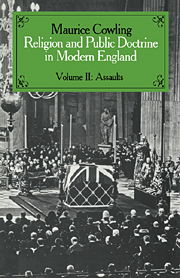Book contents
- Frontmatter
- Foreword
- Contents
- Projected contents of Volume III (for publication c. 1988–90)
- INTRODUCTION
- I THE ASSAULT ON THE EIGHTEENTH CENTURY
- II THE ASSAULT ON CHRISTIANITY
- III THE ASSAULT ON CHRISTIANITY IN THE TWENTIETH CENTURY
- IV ASSAULTS ON THE ASSAILANTS
- 11 Literature and the Counter-Revolution I
- 12 Literature and the Counter-Revolution II
- CONCLUSION: ASSAULTS AND ACCOMMODATIONS
- Notes
- Index of main names
11 - Literature and the Counter-Revolution I
Published online by Cambridge University Press: 23 December 2009
- Frontmatter
- Foreword
- Contents
- Projected contents of Volume III (for publication c. 1988–90)
- INTRODUCTION
- I THE ASSAULT ON THE EIGHTEENTH CENTURY
- II THE ASSAULT ON CHRISTIANITY
- III THE ASSAULT ON CHRISTIANITY IN THE TWENTIETH CENTURY
- IV ASSAULTS ON THE ASSAILANTS
- 11 Literature and the Counter-Revolution I
- 12 Literature and the Counter-Revolution II
- CONCLUSION: ASSAULTS AND ACCOMMODATIONS
- Notes
- Index of main names
Summary
‘Every religion … which has ever influenced great masses of mankind … is mainly a result of pure democratic action … Whilst nowhere is the power of the few – of the very few – more conspicuous than in the domain of religion, nowhere is the power of the many more conspicuous also. No religion has ever grown, become established, and influenced the lives of men unless its doctrines and … spirit have appealed to those wants of the heart and soul which have been shared, to a degree approximately equal, by all members of the communities, nations or races amongst whom the religion in question has become established.’
W. H. Mallock Aristocracy and Evolution 1898 p. 225.‘It has been said that the part which democracy plays in the development of religion is shown us by the Church of Rome with greater distinctness than it is by any other great communion of believers; and the reason is that no other great communion of believers shows us with so much precision the part played by an aristocracy, and thus leaves the part played by democracy with so sharply defined a frontier … The Roman Catholic religion, regarded as a body of doctrines which have actually influenced the spiritual lives of men, is a magnified picture, projected, as it were, upon the sky, of those secret but common elements of the human mind and heart, in virtue of which all men are supposed to be equal before God, and which unite the faithful into one class, instead of graduating them into many.’
W. H. Mallock Aristocracy and Evolution 1898 pp. 228–9.- Type
- Chapter
- Information
- Religion and Public Doctrine in Modern England , pp. 287 - 308Publisher: Cambridge University PressPrint publication year: 1985



